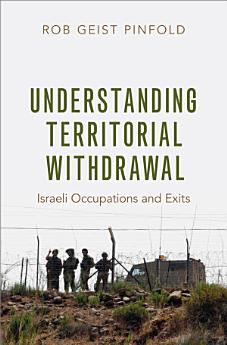Understanding Territorial Withdrawal: Israeli Occupations and Exits
Rob Geist Pinfold
Mey 2023 · Oxford University Press
5.0star
1 isibuyekezoreport
I-Ebook
345
Amakhasi
family_home
Kufanelekile
info
reportIzilinganiso nezibuyekezo aziqinisekisiwe Funda Kabanzi
Mayelana nale ebook
From Ukraine to Afghanistan and beyond, occupations and exit dilemmas permeate contemporary geopolitics. However, the existing literature on territorial conflict rarely scrutinizes a pivotal, related question: what makes a state withdraw from an occupied territory, or entrench itself within it? In Understanding Territorial Withdrawal, Rob Geist Pinfold addresses this research gap. He focuses primarily on Israel, a unique but important milieu that offers pertinent lessons for other states facing similar policy problems. As Pinfold demonstrates, occupiers choose to either perpetuate or abandon an occupation because of three factors: their relations with the occupied, interactions with third parties, and the occupier's domestic politics. He argues that each withdrawal is the culmination of a gradual process of policy re-assessment. Critically, it is a combination of local violence and international pressure that causes popular and elite opinion within the occupier to endorse an exit, rather than perpetuate the status quo. To affirm this pattern, Pinfold constructs a generalizable framework for understanding territorial withdrawal. He then applies this framework to multiple case studies, which include: Israel's withdrawal from the Sinai Peninsula between 1974-1982; its "unilateral" withdrawal from southern Lebanon in 2000; and its "unilateral disengagement" from the Gaza Strip in 2005, as well as Israel's non-withdrawals from the West Bank and Golan Heights. Overall, Understanding Territorial Withdrawal delineates commonalities that manifested in each exit yet were absent in the cases of occupation without exit. A powerful analysis of a central concern for the study of international security, territorial conflict, and the Arab-Israel conflict alike, this book provides a critical intervention that identifies why occupiers either retain, or leave, occupied territory.
Izilinganiso nezibuyekezo
5.0
1 isibuyekezo
Mayelana nomlobi
Rob Geist Pinfold is a Research Fellow at the Peace Research Center Prague and a Lecturer in International Peace and Security at Durham University's School of Government and International Affairs. He is also a Research Fellow at the Centre for Grand Strategy at King's College London and a Senior Fellow at the Herzl Center for Israel Studies at Charles University in Prague. Rob holds a PhD in War Studies from King's College London. He is a scholar of international security whose research intersects the study of strategy and territorial conflict. A British-Israeli, he divides his time between the UK and Israel.
Nikeza le ebook isilinganiso
Sitshele ukuthi ucabangani.
Ulwazi lokufunda
Amasmathifoni namathebulethi
Faka uhlelo lokusebenza lwe-Google Play Amabhuku lwe-Android ne-iPad/iPhone. Livunyelaniswa ngokuzenzakalela ne-akhawunti yakho liphinde likuvumele ukuthi ufunde uxhunywe ku-inthanethi noma ungaxhunyiwe noma ngabe ukuphi.
Amakhompyutha aphathekayo namakhompyutha
Ungalalela ama-audiobook athengwe ku-Google Play usebenzisa isiphequluli sewebhu sekhompuyutha yakho.
Ama-eReaders namanye amadivayisi
Ukuze ufunde kumadivayisi e-e-ink afana ne-Kobo eReaders, uzodinga ukudawuniloda ifayela futhi ulidlulisele kudivayisi yakho. Landela imiyalelo Yesikhungo Sosizo eningiliziwe ukuze udlulise amafayela kuma-eReader asekelwayo.




